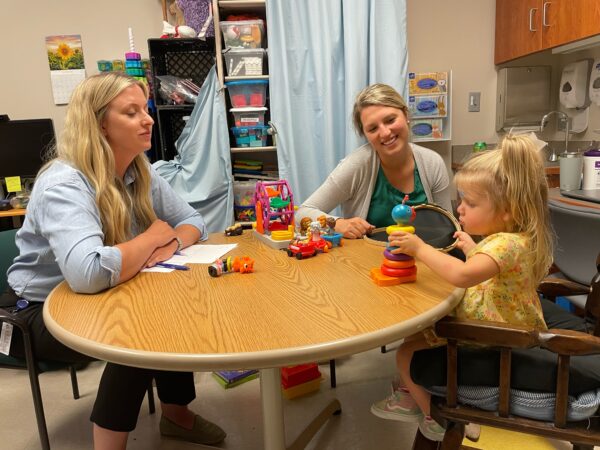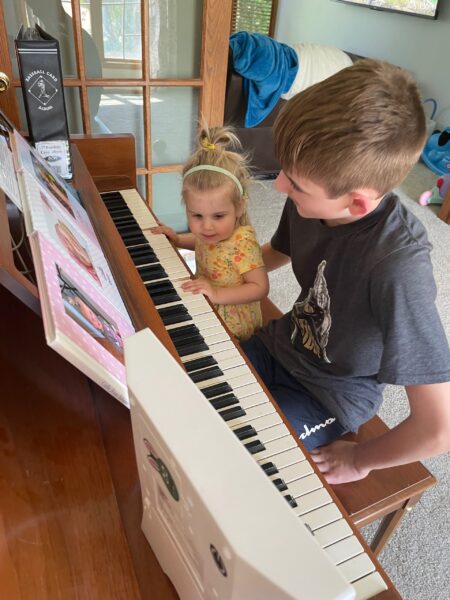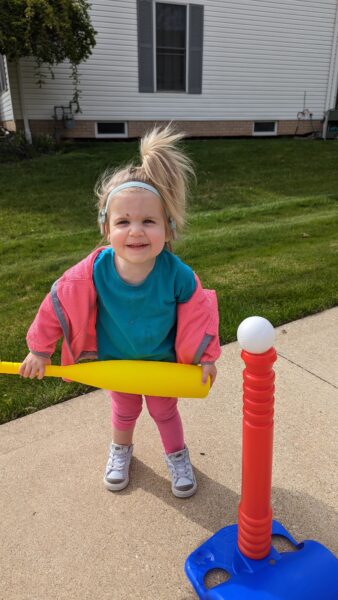
Riley engages in weekly speech therapy with Dr. Maria Houston and her students at Akron Children’s.
When Caitlyn Idoine was pregnant with her daughter Riley in 2021, she had never heard of an infection called cytomegalovirus (CMV) which pregnant women can carry and pass onto to their babies.
“CMV is the leading cause of nongenetic hearing loss and can also cause other neurological deficits and vision loss,” said Caitlyn. “A typical infection mimics a common cold in adults and is passed through bodily fluids like urine and saliva.”
Since Riley passed her newborn hearing screen, which is common with CMV, her parents weren’t aware anything was amiss until she was about 6 months old and wasn’t reacting to barking dogs or loud sounds.
“By the time she turned 1 she wasn’t talking or babbling, and we also had some gross motor concerns,” said Caitlyn.
According to the Centers for Disease Control, about 1 out of every 200 babies is born with congenital CMV. About 1 out of 5 of these babies will have birth defects or other long-term health problems.

Riley enjoys listening to, playing and dancing to all different kinds of music.
Some telltale signs that a baby might have congenital CMV include a small head size, low birth weight, feeding problems, a rash, jaundice and liver, spleen and lung problems. Saliva, urine or blood tests done within 2 to 3 weeks of birth can confirm a CMV diagnosis, but none of those were done on Riley.
During her pregnancy, Caitlyn says an ultrasound and subsequent testing showed signs of CMV, but that no one ever explained the effects it could have on her baby once she was born.
“Had I known, we could have had Riley’s hearing tested more frequently within the first few months of life and started interventions sooner,” she said.
When appropriate, babies who show signs of congenital CMV at birth may be treated with antiviral medication which may decrease the severity of health problems and hearing loss, but they can also have side effects.
After discovering at age 1 that Riley was completely deaf, her parents were faced with a decision.
“Our options were American Sign Language or cochlear implants,” said Caitlyn. “We wanted her to be able to speak and hear so we chose the implants.”

Riley, who can say about 10 words, loves playing with and throwing balls.
In Oct. 2022, at age 1 ½ , Riley had surgery with pediatric otolaryngologist Dr. Mark Nelson. The implants were turned on a month later. In Dec. she started weekly speech therapy and has been doing well.
“Riley can say about 10 words and can answer questions by saying yes,” said Caitlyn. “While she’s only been hearing for less than a year, we are pleased with her progress.”
Caitlyn attends Riley’s speech therapy appointments to learn strategies she can implement at home.
“We talk to her constantly and she has just rolled with it,” said Caitlyn. “We call her implants her Magic Ears.”
More than anything Caitlyn would like to see increased education and awareness around CMV, especially for pregnant women since doctors don’t routinely test for it.
“CMV can have serious consequences,” she said. “The best thing pregnant women can do is wash their hands a lot, wear gloves when changing diapers and not share food, utensils, cups, straws or toothbrushes with anyone, including their kids.”










